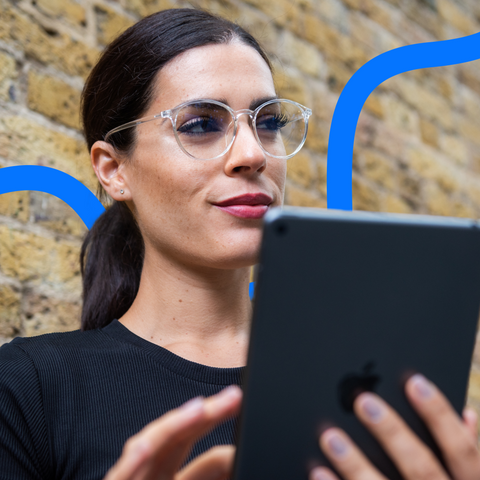On average, screen time went up almost 80% during the COVID-19 pandemic. With such a sharp increase in screen time trends, it is no surprise that awareness of the dangers of blue light - the artificial light produced by phones, computer screens, laptops and tvs; is growing too.
The visible light we see is made up of red, orange, yellow, green and blue rays with many different shades. Blue light rays have the shortest wavelength and the highest amount of energy. That’s why blue light is also called High Energy Visible (HEV) light. Due to high energy content, blue light has been linked with a number of harmful effects.
Many of us are familiar with the negative effects that our devices can have on our health. A lot of us have experienced at least one impact of increased screen time, from a disrupted circadian rhythm, insomnia, eye strain, decreased concentration, headaches and even macular degeneration.
Blue light filters are also becoming a well known and handy solution, but what is the best way to use blue light filters? In this article we explore how to maximize the health benefits associated with limiting artificial blue light exposure. We address some FAQs:
Do I need to wear blue light glasses all the time?
In a nutshell: no.
Not all blue light is created equal.

During the day, the sun is the most abundant source of blue light. We are exposed to far more blue light during the day than any device when the sun sets. Do we really need to constantly protect ourselves from it? No, blue light can be beneficial especially during the day.
Exposure to blue light suppresses the sleep-inducing hormone melatonin and boosts alertness. Blue light is helpful during the day - it elevates your mood, enhances memory and boosts your cognitive functions so you’re ready to perform at your peak.
In a perfect world, the absence of the sun and its blue light ideally allow the production of hormone melatonin and encourage restful sleep.
Unfortunately, in the modern day, the use of artificial fluorescent lighting, smartphones, tablets, laptops and other similar devices stops this natural phenomenon. We typically remain exposed to blue light well after the sun has already set.
Can I wear blue light blocking glasses all day?
Some people find that wearing blue light glasses all day long easier than remembering to wear them in the evening. Wearing them will not negatively affect you or your eyes. In fact, most users report a reduction in eye strain in doing so. Blue light protection is most valuable if you are exposed to screen time after the sun has set. Whether this is a late night social media scroll or watching a movie to unwind after a long day - wear blue light blocking glasses to protect your eyes.
Do children need protection from blue light?
Considering the many responsibilities and expenses that come with having children, their exposure to blue light is probably the furthest thing from your mind. However, if you’re wondering when to use blue light filters, this is one of the crucial scenarios.

Minimizing artificial blue light from devices is pretty critical when it comes to children. When we are born, the crystalline lens in our eyes used to focus on far away objects is very clear. As the years go by, the lens gradually yellows with age and starts absorbing HEV blue light to protect the retina. Children also possess a low amount of macular pigment which acts as the natural blue light filter in our eyes. This macular pigment only becomes sufficient after the child grows to about 9 years old. In addition to this, a child’s eyes have larger pupils than an adult, hence more light enters the eye and reaches the retina.
All these factors mean that children are much more vulnerable to eye damage by blue light. Ironically, the age group 6 to 10 saw the largest increase in screen time during the pandemic. Children of this day and age have proven to be more technologically savvy than any previous generation. Screentime forms a routine part of learning as homework is done and submitted online on a laptop. After school, entertainment is readily available in the form of games and videos.
With such widespread exposure, you should, therefore, take initiative to protect their eyes by using blue light filters. Place them on every device and screen your children have access to.
Get some blue light filtering glasses to minimise blue light exposure from TV, iPads and game consoles in the evenings.
What is the best way to minimise blue light at work

Even if you manage to end your working day strictly before sundown, and you can limit the use of artificial device in the evening, you can still benefit from filtering blue light from your devices - particularly if you spending the whole day staring at a computer screen.
Digital eye strain is another popular menace that is aggravated by blue light. So if you experience blurred vision after staring at a screen for too long, or if your eyes feel dry or tired after a day at work, these are signs that you are experiencing digital eye-strain. However, these symptoms are very common and unspecific, hence are mostly ignored because they don’t seem serious enough. Digital eye strain can lead to permanent eye problems if it's not managed. Use a blue light filter for your computer and laptop screens to nip the problem in the bud.
Whether you’re ready to embrace nerdy chic by wearing blue light blocking glasses all day long, or whether you’re looking for a more low key solution to reduce your screen time impact, browse through our selection of quality blue light filters to find the best, quality solutions for you and your loved ones.
How we reviewed this article:
Ocushield has strict sourcing guidelines and relies on peer-reviewed studies, academic research institutions, and medical associations.
- The Health Cost of Screen Time www.lenstore.co.uk/research/health-cost-of-screen-time/
- Changes and correlates of screen time in adults and children during the COVID-19 pandemic: A systematic review and meta-analysis pubmed.ncbi.nlm.nih.gov/35615691/
Our experts continually monitor the health and wellness space, and we update our articles when new information becomes available.
Written By
Dhruvin Patel | BSc Hons, MCOptom, Optometrist
Edited By
Omba Kumwenda | BA, MEng
Medically Reviewed By
Asad Hamir | BSc Hons, Optometrist
Copy Edited By
Tara Tadlock | MA

So can i use blue light filter during the day?
Leave a comment